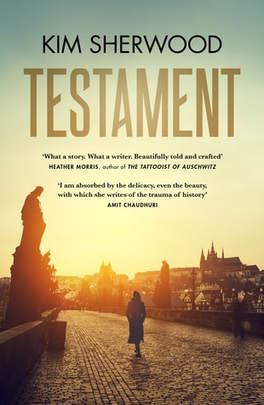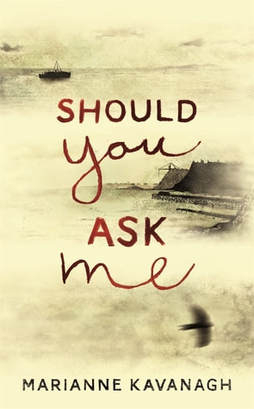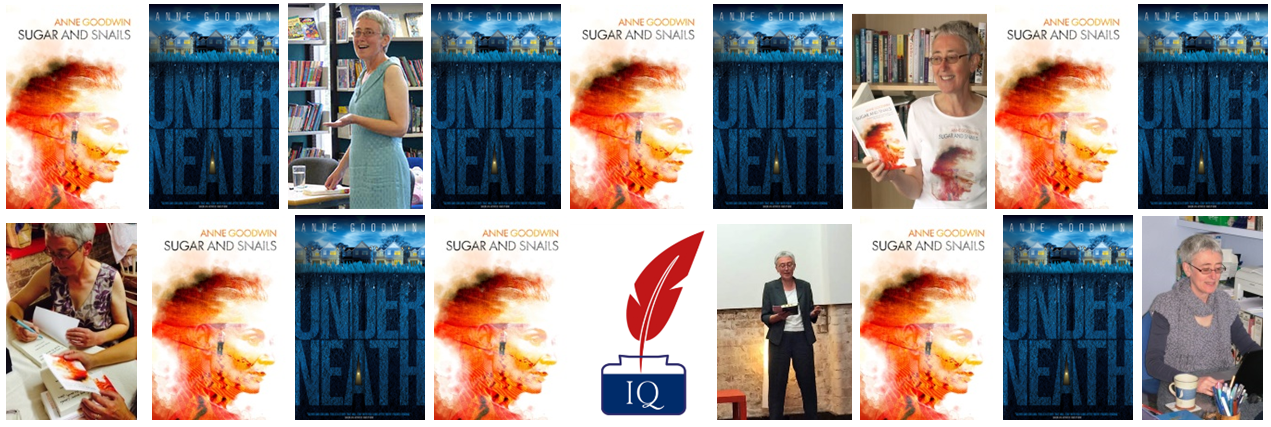Testament by Kim Sherwood
It falls to John’s twenty-something daughter Eva to piece together the different versions of her beloved grandfather’s life. When he died, she was making a documentary about him. Travelling to Berlin, and to his native Hungary, where Silk began life as Jósef Zyyad before reinventing himself as an Englishman, she wonders if she’ll finish it. Or is she, as her father insists, using her camera to hide herself?
Silk never spoke about the past. As Eva learns about the dreadful conditions he endured in the labour camps and marches, she alternates between protectiveness and a sense of having been betrayed. His testimony – responses to over 300 questions at the end of the war – if made public, would shatter the image he so carefully built for himself. On the other hand, while Eva has always respected his reticence, that he lied to his family is difficult to reconcile with the man she felt she knew.
Particularly tragic is his lack of communication with his younger brother László who settled in Israel after the war. The brothers’ attitude to past trauma couldn’t be more different: Silk’s dismissal and denial versus László’s repeated reopening of his psychological wounds to younger generations in the hope of “never again”.
Reading this novel alongside musing on Narrative structure, psychoanalytic theory and the grief that never goes, I could pick out hero’s journeys – the brothers gaining the elixir of survival, while Eva seeks the truth – but this is too big a story to confine itself to that path. What happens after survival is the question this novel asks.
This reminded me of some influential research on styles of recovery from acute psychosis which identified two distinct types: integration, similar to László in this novel, versus sealing over, like Silk. The psychosis research found no strong differences in effectiveness for either approach although, as far as I’m aware, the potential impact on significant others wasn’t investigated. So I was interested that, in Testament, Silk seems to have fared better than his brother, but at a cost, and not only to the well-being of his son.
But neither man meets the conditions object relations theory associates with resolution: László continually re-traumatised in his attempts to share his suffering; Silk clinging on to a false version of the self. But that might be the best anyone can do after bearing the unbearable.
A thought-provoking and ambitious debut novel about a shameful period of European history of which the legacy continues to this day, Testament is published by Riverrun who provided my review copy. Winner of the Bath Novel Award with plaudits from literary worthies, I trust it won’t detract from the novel’s success for me to admit I didn’t appreciate it as much as I’d hoped.
Should You Ask Me by Marianne Kavanagh
Over the course of a week, Miss Holmes gives an account of her early life, and the childhood friends who battled for her affections as they grew into young men. She paints such a vivid picture that 19th-century England seems like yesterday but, while entertaining for the reader, her digressions into looting from a shipwreck, a boxing match and slaughtering a pig prove frustrating for the young constable assigned to her case. Is she weaving a web of lies?
Distracted by his own pain, both physical and psychological, it’s hard enough for William to concentrate in the claustrophobic room where they meet. And, despite her apparent self-obsession, Miss Holmes can tell when he’s drifting off into his own memories, as he shares with the reader the tensions in his relationship with his much-admired elder brother and a tentative wartime romance.
As William coaxes the story out of Mary, she insists he reciprocates with his own tragic tale. In the process, the young man and the older woman achieve some release from the lies and guilt that have haunted their lives.
Described by the publishers, Hodder and Stoughton (to whom thanks for my review copy), as “the perfect holiday read”, Should You Ask Me is commercial fiction at its best. Although I hesitated about the voice initially, overall I found it a comfortable read that doesn’t patronise the reader, unpretentious yet with unexpected depth.
While not every novel has to fit the hero’s journey format, I’ve been rather obsessed with this lately; in those terms, Marianne Kavanagh’s third novel is about leaving the cave. It’s rather like a therapy – or co-therapy – without the anxiety-inducing boundary violations usually associated with therapy-lit.
Follow this link for another style of holiday reads.
























 RSS Feed
RSS Feed





















